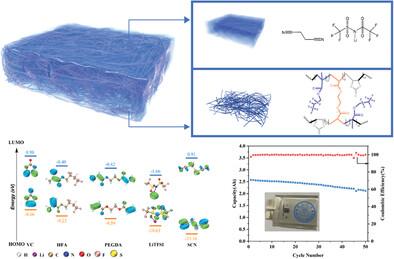Molecular Design for In-Situ Polymerized Solid Polymer Electrolytes Enabling Stable Cycling of Lithium Metal Batteries
Advanced Energy Materials
(
IF
26
)
Pub Date : 2024-03-05
, DOI:
10.1002/aenm.202400428
Hao Peng
1
,
Tairen Long
1
,
Jun Peng
1
,
Hui Chen
1
,
Lifei Ji
1
,
Hui Sun
2
,
Ling Huang
1
,
Shi‐Gang Sun
1
Affiliation
State Key Laboratory of Physical Chemistry of Solid Surfaces College of Chemistry and Chemical Engineering Xiamen University Xiamen 361005 China
State Key Laboratory of Heavy Oil Processing Beijing Key Laboratory of Biogas Upgrading Utilization College of New Energy and Materials China University of Petroleum‐Beijing Beijing 102249 China

The practical application of polymer electrolytes is hindered due to the low ionic conductivity and the interfacial instability between the electrodes. Herein, a strategy for designing solid polymer electrolytes is developed that facilitates the rapid lithium-ion migration through weak coordination with polymer chain segments, as well as the fast ion channel transport of oligomers. Moreover, the in situ-produced solid polymer electrolyte (PFVS) can form stable LiF-rich interfaces with both the lithium metal anode and different cathodes. When the PFVS is applied in Li-metal batteries, excellent properties are achieved at room temperature. A Li||Li symmetric cell can be stably cycled for 4000 h at a current density of 0.1 mA cm−1, a Li||LiFePO4 full cell can maintain capacity retention as high as still 94.4% after 600 cycles at 1 C, and a Li||NCM811 full cell can retain 80% capacity after 180 cycles at 1 C. A 2.6 Ah Graphite|PFVS|NCM90 pouch cell is made for demonstrating the practical application potential, and it can be also stably cycled. The developed strategy provides a promising path for designing solid polymer electrolytes that can effectively extend the lifespan of Li metal batteries.
中文翻译:
